Britain's top diplomat said Thursday that the United Kingdom could officially recognize a Palestinian state after a ceasefire in Gaza and despite waiting for the outcome of what could potentially be years-long talk between Israel and the Palestinians.

Foreign Secretary David Cameron, speaking to The Associated Press during a visit Thursday to Lebanon intended to tamp down regional tensions, said no recognition could come as long as Hamas remained in Gaza but that it could happen while Israeli and Palestinian leaders negotiate.
Cameron, a former British Prime Minister, said U.K. recognition of an independent state of Palestine, including in the United Nations, "can't come at the start of the process, but it doesn't have to be the very end of the process."
"It could be something that we consider as this process, as this advance to a solution, becomes more real," Cameron continued. "What we need to do is give the Palestinian people a horizon towards a better future, the future of having a state of their own."
That prospect is "absolutely vital for the long-term peace and security of the region," he declared.
Britain, the U.S., and other Western countries have supported the idea of an independent Palestinian state to exist alongside Israel as a solution to the region's most demanding conflict.
The countries agreed that the independent state should become part of a negotiated settlement. There have been no concrete negotiations of any sort since 2009.
Israeli Prime Minister Benjamin Netanyahu has repeatedly and publicly rejected the creation of a Palestinian state after the war and continues to boast that he's highly instrumental in preventing Palestinian statehood.
What several of Israel's allies do realize is that their recognition of a Palestinian state without Israel's two cents could isolate Israel and put pressure on it to come to the negotiation table.
According to Cameron, the first step must be a "pause in fighting" in Gaza, eventually turning into "a permanent, sustainable ceasefire."
Additionally, for his country to recognize an independent state, the leaders of Hamas would need to leave Gaza "because you can't have a two-state solution with Gaza still controlled by the people responsible for Oct. 7," he said.
Still, in review of a proposal Hamas received earlier this week, drafted by Qatar and Egypt, to agree to a ceasefire with Israel, their position maintains that its leaders would not leave the enclave as part of a deal.
What Does The United Kingdom Want?
The U.K. is also proposing a plan to subside tensions on the Lebanon-Israel border, where Lebanese militant group Hezbollah and Israeli forces have been trading fire daily for the past four months, egging on a bigger war.
The proposal would allegedly include Britain training Lebanese army forces to carry out more security work in the border region.
The Guardian reported Cameron will make his fourth visit to the Middle East this week since being appointed foreign secretary in November. The trip is meant to de-escalate the heightened tensions in the region.
"We are determined to do all we can to press for a sustainable ceasefire and are stepping up our engagement with countries in the region to make sure that happens," he said.
The Foreign Office said the Red Sea crisis was likely to form a "major focus" of the former prime minister's discussions during the trip.









